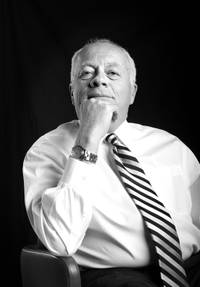VEGAS INC Coverage
Like my many media brethren, I’ve encountered a lot of different definitions of “news” over the years.
In college, a parade of journalism professors struggled to teach us long and elaborate definitions, the kind you could never memorize. Later, as a rookie journalist surrounded by older editors, I was handed a terse working definition of news as information representing “a deviation from the norm.”
I’m not sure that still works, but however one defines it, there are a few subjective aspects to news. For example, one size doesn’t fit all: An event considered newsworthy to one individual may be old or irrelevant to another. Another given is that—with exception for the occasional big story with ongoing developments—today’s news is generally not of as much interest tomorrow.
When the Nevada legislature convened for its semiannual session six months back, proposed cuts in our education budget were indeed news. But once the session ended and the budgets had been massacred, public interest migrated to other things, like the Harmon Hotel, the Electric Daisy Carnival and a new mayor.
Wondering how educators would be moving forward on a new landscape, I made an appointment to go see Dr. Michael Richards, who has been president of College of Southern Nevada since May 2008—a tenure, incidentally, that happens to closely coincide with the downturn in the state’s economy.
President Richards had no idea why I was calling, but he nonetheless agreed to see me first thing on a sunny Monday morning. When we sat down in his office, he didn’t seem wary of my trusty Reporter’s Notebook. But then, college presidents aren’t easily intimidated.
All things considered, CSN has done well under Richards’ leadership. Among other successes, relationships with the Clark County School District have improved. Crisis has a way of bringing different factions together, of course. But Richards thinks the secondary system that produces so many CSN enrollees gets a bad rap.
“Our relationships with K-12 are probably stronger than they’ve ever been,” he said. “We want to keep that alive and thriving. But if the taxpayers of Nevada knew the success of their high schools, they would invest far more.”
With 44,000 students bustling about on its three campuses and online study programs, CSN is the largest educational institution in Nevada. It’s been a more popular place in our economic downturn. In a recession, lots of people want to be re-tooled.
“An older population is coming back,” he said. “We’re also seeing a lot of vets.”
Nevada doesn’t subsidize summer school, so enrollment typically drops off dramatically this time of year. And in the summer, every course must meet a minimum number of students or be canceled. Still, this year’s summer session enrollment is up five percent over 2010.
Last fall, CSN turned away an estimated 5,000 students because there simply weren’t enough resources to handle them.
“They just went elsewhere,” Richards said.
One option for many has been online studies. CSN offers 30 degrees and certificates through this program, and now counts about 14,000 online students a year.
By the end of this biennium, Richards noted, Nevada educators will have been through six consecutive years of cuts.
“It’s like a constant pressure,” he said, citing an impact on recruiting and retention alike. “It’s depressing our employees. To faculty we want to retain, it’s been very tough.”
CSN employees got a five percent pay reduction, reflected in six days of furlough and a two-and-a-half percent salary rollback. They’ll now pay more of their share of medical and retirement benefits. He said pervasive staff and program uncertainties add to the complications faced by its leadership.
“You just don’t manage an organization this size on a year-to-year basis,” he said.
I pointed out that it’s well-known that plenty of southern Nevadans have done well for themselves despite not having a college education.
He patiently noted that a lot of these folks once were in the booming construction and real estate industries; now, many are among the students taking classes through CSN. He noted that most workplaces now require skills in math and other basics, as well as an ability to navigate a computer.
Once the legislative session ended, Richards and his administration immediately began interpreting what really happened, and then began adjusting to the new reality with revised procedures, systems and contracts.
In the first week of September, the Board of Regents convene, and the whole political cycle starts anew. Between now and the next session, struggling educators can only hope that their plight doesn’t become yesterday’s news.
